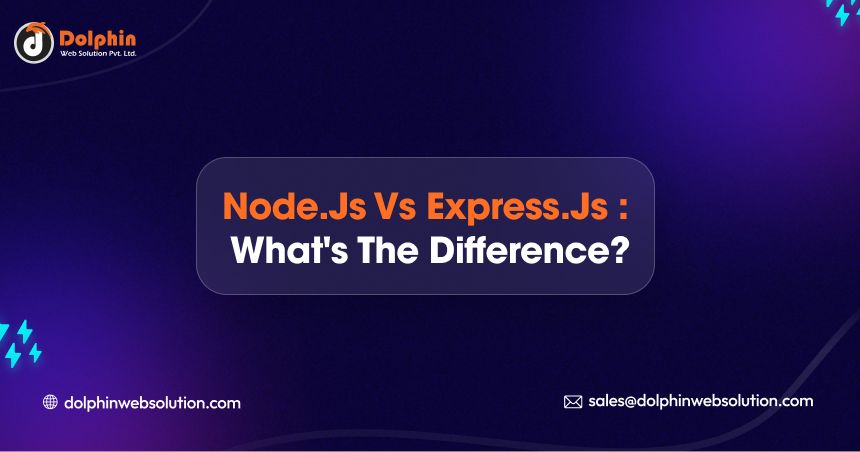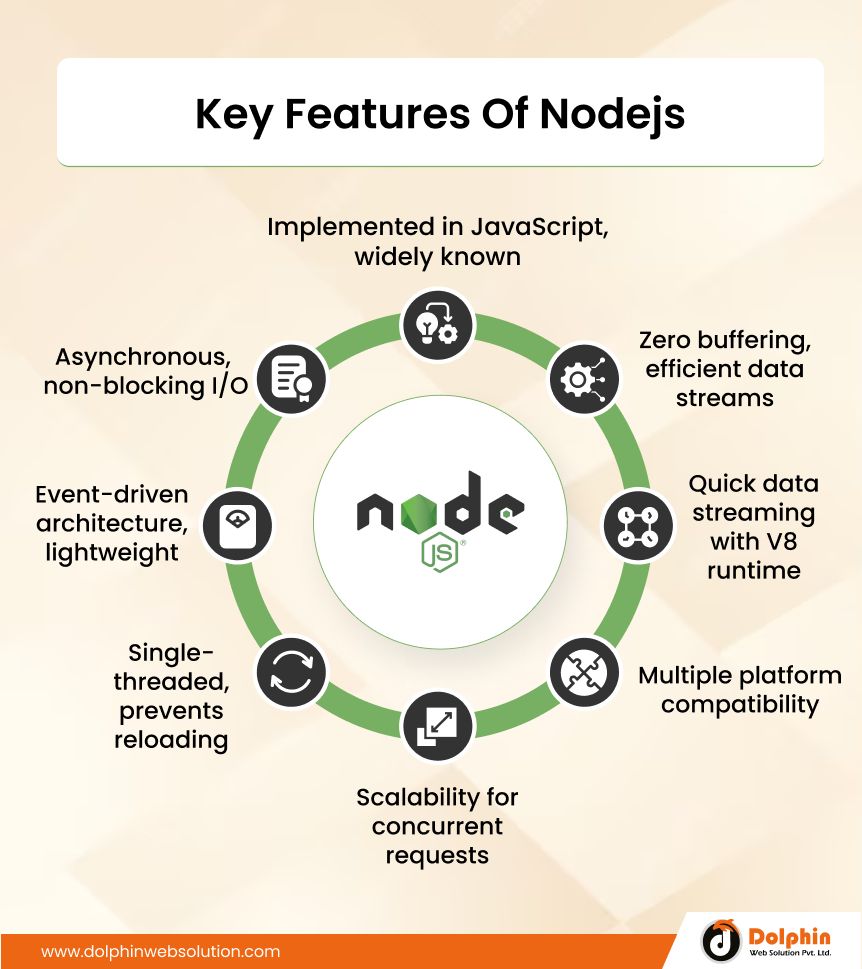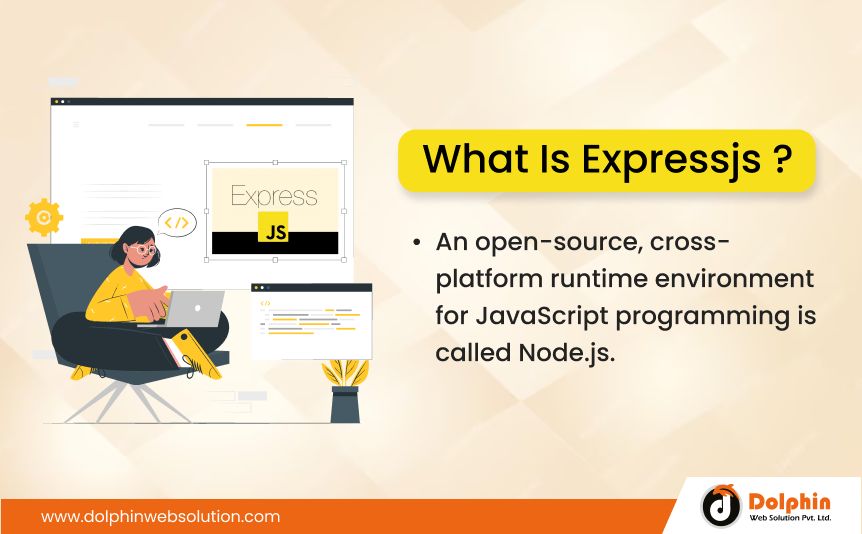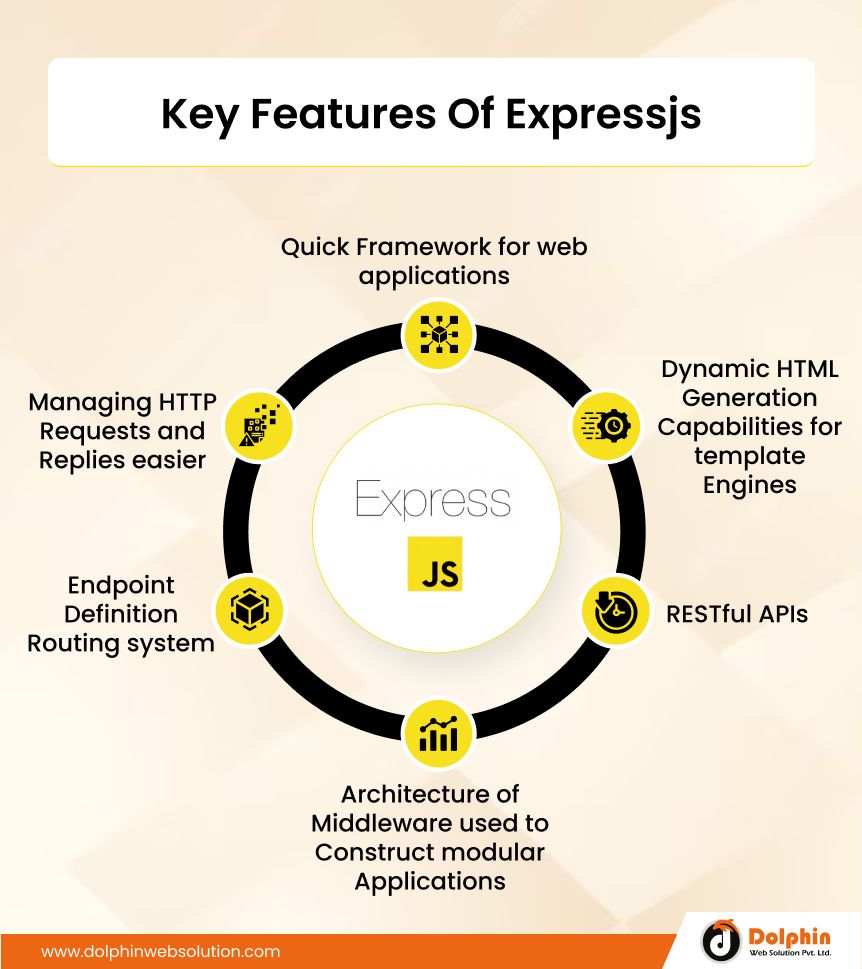Node.js Vs Express.js: What’s The Difference?

Table of Contents
Summary :
Explore our blog to learn about Node.js vs. Express.js differences. Whether you're a novice or an expert, find the ideal match for your web development.
Introduction
High-performance applications are the focus of the server-side JavaScript runtime Node.js. Express.js, tailored for Node.js, streamlines web development via middleware and routing. It is crucial for building reliable, efficient, and scalable online apps, whether experienced or new. You can a hire Node Js developer for easy nodejs website or app development. In this article, we will analyze what are the main difference between nodejs vs expressjs and which is better in which situations. So, which one to choose: nodejs or express js? Let’s find it out.
What Is Nodejs?

An open-source, cross-platform runtime environment for JavaScript programming is called Node.js. Initially created for event-driven, non-blocking servers, it’s well-suited for backend API services and traditional websites. It’s crucial to note that Node.js is a runtime environment, providing Web APIs for JavaScript engine development, distinguishing it from a library or framework.
Key Features Of Nodejs

- Implemented in JavaScript, widely known
- Asynchronous, non-blocking I/O
- Event-driven architecture, lightweight
- Single-threaded, prevents reloading
- Scalability for concurrent requests
- Multiple platform compatibility
- Quick data streaming with V8 runtime
- Zero buffering, efficient data streams
Pros Of Node Js
- Programmers can create code as they like because everything is designed from the ground up with fewer restrictions.
- It improves scalability and accelerates performance by enabling you to handle several requests simultaneously.
- Allows access to readily available solutions and codes, making it easy for startups and beginner developers.
- Developers that are familiar with front-end languages such as Javascript will find it easy to adjust to the
- framework. allows Node.js developers to create front-end and back-end Javascript applications. This lowers the learning curve and allows programs to be deployed smoothly.
- For quicker response times, cache individual modules in the application memory and do away with the need to rerun the code.
- Assists developers with commonly used tools for different purposes, such as testing or identifying project dependencies.
Cons Of Node Js
- Since everything needs to be written from scratch, you may experience a decline in productivity. Beginners need help to build apps from scratch due to the non-opinionated nature of Node.js.
- Node.js struggles with extensive processing (CPU-demanding) apps despite supporting sophisticated applications. Additionally, because multi-threaded programming is not supported, it performs computations more slowly.
- Difficult to maintain code due to Async nature’s nested callbacks and a firm reliance on asynchronicity makes it challenging to comprehend and laborious to maintain code.
- Because of the open-source ecosystem, specific Node.js tools are incorrectly constructed and must adhere to good coding standards.
What Is Express JS

Express.js is the leading web framework for Node.js, renowned as the go-to server framework. Developing a Node.js backend from scratch can be time-consuming, involving boilerplate code like port and route setup. Express.js streamlines this process, allowing developers to focus on essential business logic and accelerating application development.
Key Features Of Express Js

- It is a simple, quick framework for web applications.
- It makes managing HTTP requests and replies easier.
- This is an endpoint definition routing system.
- It is an architecture of middleware used to construct modular applications.
- It offers assistance in developing RESTful APIs.
- It offers versatility in processing HTTP methods and constructing routes—a vibrant community with a large middleware module ecosystem.
- It offers dynamic HTML generation capabilities for template engines.
Pros Of Express Js
- Express employs Javascript for both front-end and back-end development. Developers can write code more rapidly without learning a new language.
- The middleware in Express is designed to facilitate error detection in synchronous and asynchronous programs.
- For companies that get hundreds of I/O requests and notifications from consumers every day, Express is a great option.
- Express does not impose rigid guidelines on handling particular jobs, so you can use middleware packages and components however you see fit.
Cons Of Express Js
- Express doesn’t need a set structure, but this might become problematic if the team grows and engineers work on the app’s many features. As a result, teams must adhere to a framework throughout the project.
- One of the most often reported problems with the Express framework is callbacks, which arise from developers’ inability to understand the complex programming style. However, the Express team has investigated the persistent issue and provided some respite.
- It might be challenging for developers unfamiliar with Express to comprehend and use the middleware features.
Node Js Vs Express Js: Top Differences And Comparison
Nodejs Vs Express Js: Performance
Node.JS
Node.js with its event-driven, non-blocking I/O architecture, Node.js excels in managing concurrent connections with minimal latency. Its speed and performance make it ideal for applications requiring high concurrency.
Express JS
Express, a lightweight Node.js framework, provides comprehensive functionality for web apps, simplifying server configuration and offering an intuitive interface for creating and handling user routes.
Nodejs Vs Express Js: Routing
Node.js
A runtime environment called Node.js allows JavaScript code to be executed outside a web browser. In Node.js, routing can be manual, requiring developers to construct routes and handle HTTP requests. It offers fundamental features for online apps and allows custom routing strategies.
Express.js
Express.js, a Node.js web framework, streamlines routing, making it more convenient and efficient. It streamlines routing by offering a more organized and systematic approach to route definition and HTTP request processing. Developers may quickly build routes and specify how the application should react to different destinations with Express.js. Express.js’s integrated routing system improves efficiency and lowers the complexity of managing courses, which makes it an excellent option for developing online applications with clearly defined endpoints.
Nodejs Vs Express Js: Middleware
Node.js
With Node.js, middleware may be manually developed, giving developers greater control over the procedure. They can design unique middleware functions to manage different duties in the cycle of requests and responses. Although this flexibility enables highly customized solutions, it also increases installation and maintenance work.
Express.js
It provides a more simplified method for middleware. Because middleware features are integrated at its core, developers may quickly add them to the request-response cycle. An enormous selection of easily accessible middleware packages for routine operations like logging, authentication, and more are offered by Express.js.
Nodejs Vs Express Js: Ecosystem And Libraries
Node.js
Node.js boasts a robust ecosystem with a vast npm library, offering modules for diverse applications, from networking to web servers.
Express.js
Express.js aligns with Node.js, extending its capabilities with web development-specific tools and packages. It provides a solid foundation for rapid online app creation.
Nodejs Vs Express Js: Development Speed
Node.js
Because it doesn’t impose any additional structure, Node.js alone can be quicker and more flexible for some use cases, allowing developers to create apps precisely as needed.
Express.js
Node.js web apps can be quickly and easily built with Express.js, which speeds up development. It makes handling requests, building routes, and developing RESTful APIs easier by offering a large selection of middleware and pre-built functionality. Particularly for smaller projects or when you need to quickly deploy an MVP (Minimum Viable Product), this simplicity may lead to faster development.
Nodejs Vs Express Js: Scalability
Node.js
It offers exceptional performance and scalability by leveraging asynchronous, non-blocking I/O operations. Its event loop efficiently manages multiple connections within a single thread, enhancing responsiveness. Node.js is renowned for rapid development, utilizing user-friendly JavaScript.
Its event-driven, non-blocking architecture accelerates coding, ideal for microservices, real-time apps, and APIs. The extensive npm module library further expedites development by enabling the integration of pre-made components.
Express.js
Express.js accelerates development by providing a simple and rapid method for creating web apps using Node.js. For performance-driven web projects, Express.js, focusing on conventions and best practices, is a top choice that further speeds up development.
Nodejs Vs Express Js: Ease Of Learning
Node.js
It is powered by JavaScript and is known for its user-friendly nature. Developers familiar with JavaScript can seamlessly transition to Node.js due to shared concepts. Although its single-threaded, event-driven architecture can challenge newcomers to asynchronous programming, practice makes it understandable. Abundant online resources, tutorials, and a supportive community facilitate Node.js learning.
Express.js
JavaScript’s inherent simplicity extends to Express.js, built on Node.js. Even those with basic JavaScript knowledge can quickly embrace Express.js, streamlining web app development. The well-thought-out and documented framework architecture of Express.js makes learning easier since developers may adhere to known patterns and best practices. Express.js is a beginner-friendly option for web development since, although dealing with sophisticated routing and middleware might add some complexity, mastering the platform generally is relatively easy.
Nodejs Vs Express Js: Community And Support
Node.js
As per Stack Overflow, Node.js boasts a robust community, with 51.4% of professional developers favouring it for frameworks and tools. Contributions from tech giants like Amazon, Facebook, and Google have further enriched the ecosystem, lending credibility to the technology.
Express.js
Express, a globally popular framework, undergoes constant open-source community review and improvement. A technical committee meets weekly for development and maintenance discussions, with their videos on the Express YouTube channel. It maintains a strong presence with over 282 contributors, 145 releases, and 52.6k GitHub followers. Additionally, Express boasts 5559 Gitter followers and a chatroom for user discussions.
When to Choose Node JS and Express JS
Because of their differences, which express js vs node js, you should choose for your following project matters. Choosing the right one will define the accuracy and the results you get from your project.
When To Choose Node Js
- Aiming to build web applications backed by robust data processing capabilities.
- When you need to design a web app for seamless media streaming.
- While developing a single-page web application.
- Aspiring to enhance web applications with powerful data processing functionalities.
- Intending to create a real-time, multi-user online application.
- Choose Node JS if you want a server-side environment that is quick and efficient. It can manage a lot of traffic and real-time data while managing several connections simultaneously.
- Wanting to expand your app’s functionality and manage the demands of numerous users.
- For creating a real-time application that uses Express servers that don’t block.
- Like Unsplash, you want to create a website where millions can share and export photos.
When To Choose Node Express Js
- For creating a website that, like Unsplash, enables millions of users to share and export photos.
- To develop real-time software that takes advantage of Express servers that aren’t blocklisted.
- If you want to develop online apps fast and effectively, go with Express JS. Based on Node JS, Express JS is a framework that facilitates development. It has middleware, routing, and template rendering features.
- Building RESTful APIs is an excellent use case for Express JS. It is simple to operate, versatile, and lightweight. It is simple to work, versatile, and light. It makes integrating middleware, processing requests, and creating API endpoints easier.
Conclusion
Despite their differences, Node JS and Express JS are still excellent options for website owners looking to add full-stack functionality, and they are both backward-compatible with front-end code. Put otherwise, one language may be combined to create a completely functional website.
The more versatile choice, NodeJS, works with most types of apps. Conversely, CEOs, CTOs, and product owners who wish to create an MVP to assess product-market fit should use Express.JS. Even though we have covered many features that distinguish Express JS from Node JS, it is evident that the latter is more powerful. Our ProCoders team is available to design a fully functional app and provide you with the finest possible experience. If you are looking to hire Dedicated Node JS developers then contact us.


